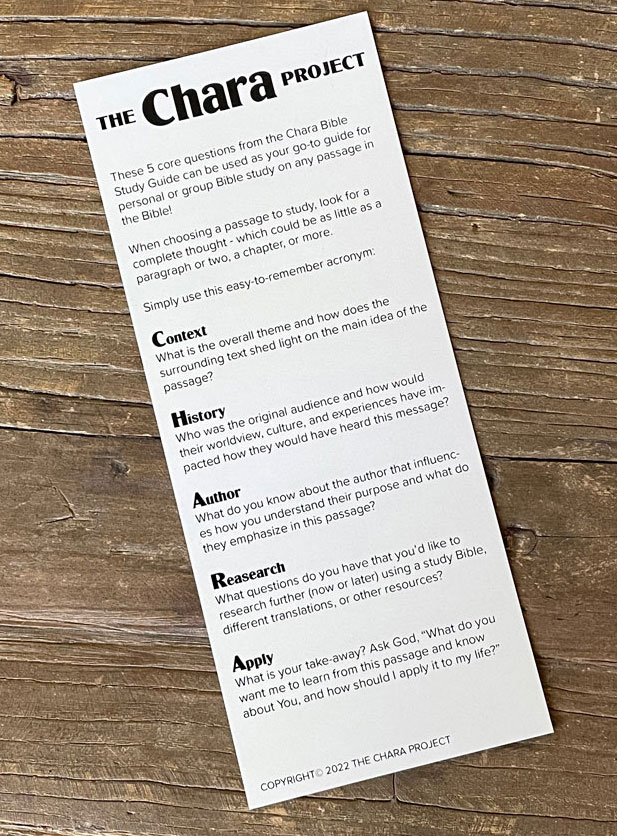“In fact, the law requires that nearly everything be cleansed with blood, and without the shedding of blood there is no forgiveness.” (NIV)
Welcome to the Bible Study Guide for Hebrews 9:22, which leverages questions from the CHARA Bible Study Guide when studying this verse. Below are the questions the Chara team chose to ask, in the order they chose to ask them, but feel free to use other questions or change up the order as you dive into this passage. For ANSWERS from the Chara team on these questions, check out the video below.
RESEARCH
Observations & Questions: What questions do you have when you reread the passage more than once? We may see a verse like this and wonder, “Why did the law require blood for forgiveness of sins?”, “What is the law?”, or “Why was there animal sacrifice in the Bible?”
CONTEXT
Immediate: What is the theme or main idea found in the surrounding paragraph(s)? Read the full chapter of Hebrews 9 to see the concept of two covenants being communicated – the 1st covenant that temporarily covered our sins with the bloodshed of animals, and a 2nd covenant through Christ’s bloodshed that is permanent and covers our sins once and for all. How does understanding the theme or main idea help provide more clarity to determine what Hebrews 9:22 means?
HISTORY/AUTHOR
Who was it written to? What was the author’s purpose, why was it written, and what insight does it provide into the passage? (Hint: check out the intro to Hebrews in a Study Bible to see that it was written to Jewish Christians that were drawn to their Old Testament rituals and ceremonies to cover their sins, and the author’s purpose was to help correct their thinking and point them back to Christ as the answer).
HISTORY
What worldview, cultural, religious, political factors and experiences were a part of their world and how did that influence them? Familiarize yourself with the Old Testament law that the Jewish Christians understood. Use cross references, which should point you to places in the Old Testament like Genesis 2:17, Exodus 24:6-8, Leviticus 16 (overview of Day of Atonement) and Leviticus 17:11 (purpose of bloodshed).
RESEARCH
Original Language: What does “atonement” mean in the original language? (Hint: use Biblehub.com, BlueLetterBible.org or Logos Bible software to look up the original Greek word for “atonement” used in Leviticus 17:11 to see it means: “to cover, or to make good”.) How does knowing the meaning of “atonement” help you understand Leviticus 17:11 more clearly?
CONTEXT
Book: Is the theme repeated throughout the book? Check out cross references, and pay special attention to Hebrews 10:1-10 and Hebrews 7:23-27. What’s your reaction to knowing “we have been made holy through the sacrifice of the body of Jesus Christ ONCE AND FOR ALL” (Heb 10:10)?
Bible: Does my interpretation hold true throughout the rest of the Bible? Use cross references that point all over the Bible to places like Genesis 3:21 (where we see the first covering of sin via animals), 1 Peter 1:18-19, John 1:29, 2 Corinthians 5:21, Revelation 5:12-13 (to see how Jesus is referenced as a sinless lamb), and Romans 3:23, 1 John 1:9 (to see how we’re all sinners in need of a Savior). How do these verses provide clarity or better understanding around our verse and/or the concept of the sacrifice needed to cover our sins?
APPLY
Yield: What personal, cultural, or religious bias and assumptions do you bring to the text? What do you need to surrender, if anything, to be in harmony with the Bible? (For example: We may be coming into this verse not realizing we’re sinners (Romans 3:23) – that original bloodshed of animals, and ultimately the bloodshed of Christ is what was needed to cover our sins. Or we may need to surrender to the idea that the cost of our sin is death and in response accept God’s gift of Jesus.)
Ask: What do you learn about God – His character, attributes, or desires? What did you learn about the MERCY of God? Read Romans 5:8. How does that give you comfort and understanding of God’s love for us?
Pray: “Lord, what do you want me to learn and how should I apply this to my life?”


